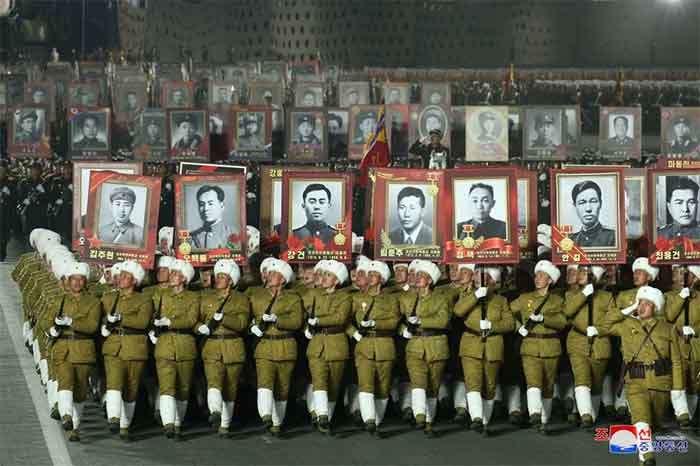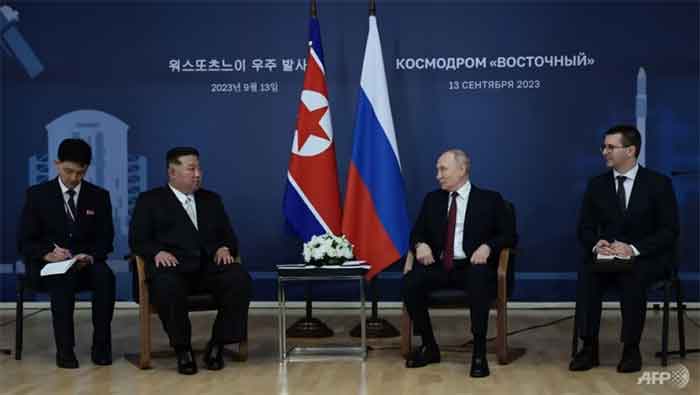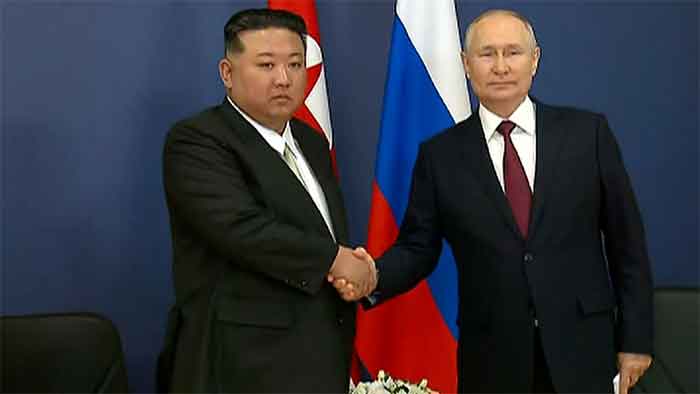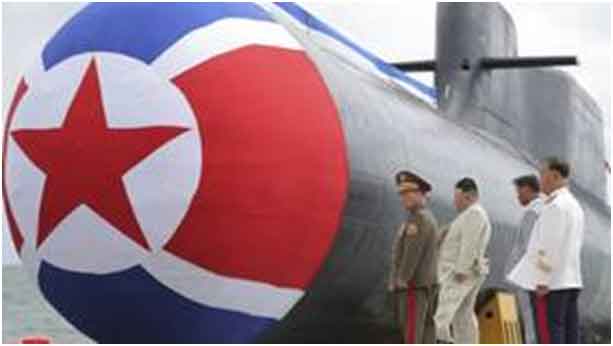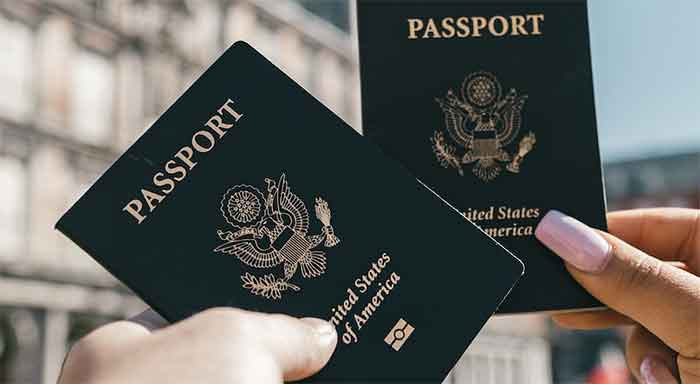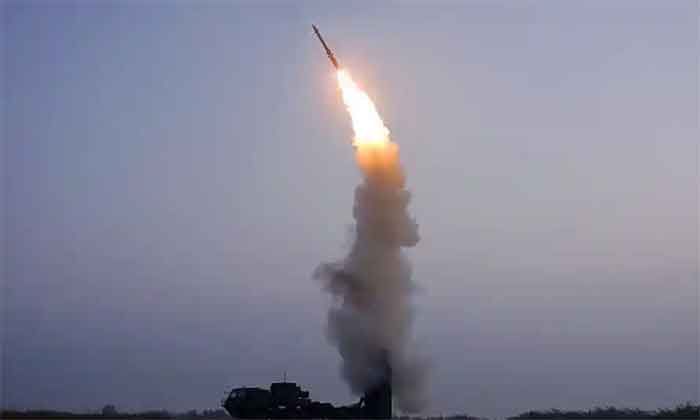
North Korea fired a newly developed anti-aircraft missile on Thursday, North Korean state media KCNA reported, the latest in a recent series of weapons tests that has come as denuclearization talks with the U.S. have been in deadlock.
It was North Korea’s second known weapons test this week after the launch of a previously unseen hypersonic missile on Tuesday. It has also fired ballistic missiles and a cruise missile with potential nuclear capabilities in recent weeks.
The tests highlighted how North Korea has been steadily developing increasingly sophisticated weapons, raising the stakes for efforts to press it to give up its nuclear and missile programs in return for U.S. sanctions relief.
The Academy of Defense Science, a military weapons developer, said the test was aimed at confirming the practical functionality of the missile’s launcher, radar, comprehensive battle command vehicle and combat performance, the official KCNA news agency reported on Friday.
The missile has new key technologies such as twin rudder control and double impulse flight engine, it said.
South Korea’s military said detailed analysis was needed to verify the KCNA report.
North Korean leader Kim Jong Un did not appear to have attended the test, which was instead overseen by Pak Jong Chon, a member of the ruling Workers’ Party’s powerful politburo and Central Committee.
“The remarkable combat performance of the new-type anti-aircraft missile with features of rapid responsiveness and guidance accuracy of missile control system as well as the substantial increase in the distance of downing air targets has been verified,” KCNA said, citing the academy.
North Korea has said in recent weeks that its weapons tests are aimed at boosting its defense capabilities just as other countries do, accusing the U.S. and South Korea of “double standards” and “hostile policy” toward it.
On Wednesday, Kim said he has no reasons to attack South Korea and was willing to reopen severed inter-Korean hotlines. But it criticized U.S. President Joe Biden’s administration for using “more cunning ways and methods” in pursuing hostile policy while proposing dialogue.
South Korea’s Unification Ministry, which is in charge of North Korean affairs, said the North did not answer the lines on Friday but it vowed to continue efforts to restore the channels and resume talks.
South Korean President Moon Jae-in, in a speech celebrating the 73rd Armed Forces Day on Friday, did not refer to North Korea but said he was committed to fostering lasting peace while sternly responding to any life-threatening action.
Analysts say the North’s carrot-and-stick approach is aimed at securing international recognition as a nuclear weapons state and driving a wedge between the United States and South Korea, with an eye on Moon’s desire for a diplomatic legacy before his term ends in May.
The Biden administration has said it has no hostile intent toward North Korea and has called on it to accept its offers of talks to break the impasse over denuclearization negotiations.
While the North Korean media did not elaborate on the reported test, it follows another launch announced the day prior which purportedly tested a new “hypersonic” munition, or a missile capable of traveling at five times the speed of sound, known as Mach 5, or faster. Another newly developed rail-borne missile system was also tested prior to that.
Asked about the earlier missile tests during a Thursday press conference, U.S. Secretary of State Antony Blinken told reporters the Joe Biden administration is monitoring the situation and is “concerned” about the launches, also noting that Washington’s envoy to Pyongyang is now in discussions with his counterparts from Seoul and Tokyo about next steps.
“On North Korea, we are evaluating and assessing the lunches … to understand exactly what they did, what technology they used. But regardless, we have seen repeated violations now of UN Security Council resolutions that the international community needs to take very seriously,” Blinken said, referring to Security Council measures barring North Korea from such weapons tests.
Breaking with his country’s typically aggressive rhetoric, on Thursday North Korean leader Kim Jong-un expressed interest in re-engagement with the south, hoping to eventually see “durable peace settling in the Korean Peninsula.” The overture came after the two Koreas agreed to reopen a cross-border communications channel shuttered the year prior, what Pyongyang hailed as a “big step” toward restoring trust between the two sides.
However, the North has argued time and again that Washington stands in the way of Korean rapprochement, with the country’s ambassador to the UN Kim Song delivering a fiery address before the General Assembly in New York this week. In the speech, Kim outlined Pyongyang’s grievances with the U.S. and its “hostile” policies – chief among them the stationing of tens of thousands of American troops south of the DMZ, as well as regular joint military drills with Seoul “of intimidating nature.”
“The US’ hostile policy against the DPRK finds its clearest expressions in its military threats against us,” he said, using the acronym for the formal name of his country, the Democratic People’s Republic of Korea.
North Korea has said not a single foreign troop, not a single foreign military base exits in the territory of the DPRK. But in South Korea, almost 30,000 U.S. troops are stationed at numerous military bases, maintaining a war posture to take military action against the DPRK at any moment.
Kim Jong-un tells South to drop ‘delusions’ of provocations from Pyongyang
North Korean leader Kim Jong-un has said he is willing to restore a hotline between the two Koreas, but he says Seoul must drop its “delusion” that its northern neighbor wants to cause it any harm or provoke.
North Korean state media KCNA reported on Thursday that Kim had expressed interest in reviving the severed telephone channels from October “as part of the efforts for realizing the expectations and desire of the entire Korean nation to see the earlier recovery of the north-south relations … and durable peace settling in the Korean peninsula.”
Speaking at the Supreme People’s Assembly, Kim remarked that inter-Korean relations “stand at a crossroads.”
According to him, ties must either take the course of advancing towards reconciliation and cooperation, or suffer national division “amid a vicious cycle of confrontation.”
Pyongyang refused to answer a routine call in August in protest over joint South Korea-US military drills being held, with Kim Yo-jong, the sister of the North Korean leader, accusing Seoul of engaging in “perfidious behavior.”
The refusal followed the reopening of the channel in June, after the connection had been severed a year earlier due to bad relations between the two countries. Following the decision to cut ties, North Korea blew up an inter-Korean border office in Kaesong that facilitated communication.
The North Korean leader now says that restoration depends on the attitude of Seoul’s authorities. He added that Pyongyang has “neither aim nor reason” to provoke its southerly neighbor.
Kim also accused Seoul and the U.S. of destroying the stability and balance of the peninsula and causing more complicated dangers through excessive military presence and activities.
Taking special aim at Washington, Kim accused the White House of proposing talks with Pyongyang without changing its “hostile policy” and even using “more cunning ways and methods.”
However, the U.S. rebuffed Kim’s claims and urged for the nation to return to dialogue, according to South Korean news agency Yonhap.
Hypersonic missile
An earlier media report said:
North Korea has launched several projectiles in recent weeks, with Pyongyang firing a new “hypersonic missile” off its east coast on Tuesday.
Earlier this month, one test reportedly involved deploying a long-range cruise missile, as well as a newly developed rail-borne warhead.
Seoul also recently fired a submarine-launched ballistic missile; Pyongyang blasted its southerly neighbor’s attempt as “sloppy” and “self-comforting,” warning that this could derail the peninsula’s peace.

